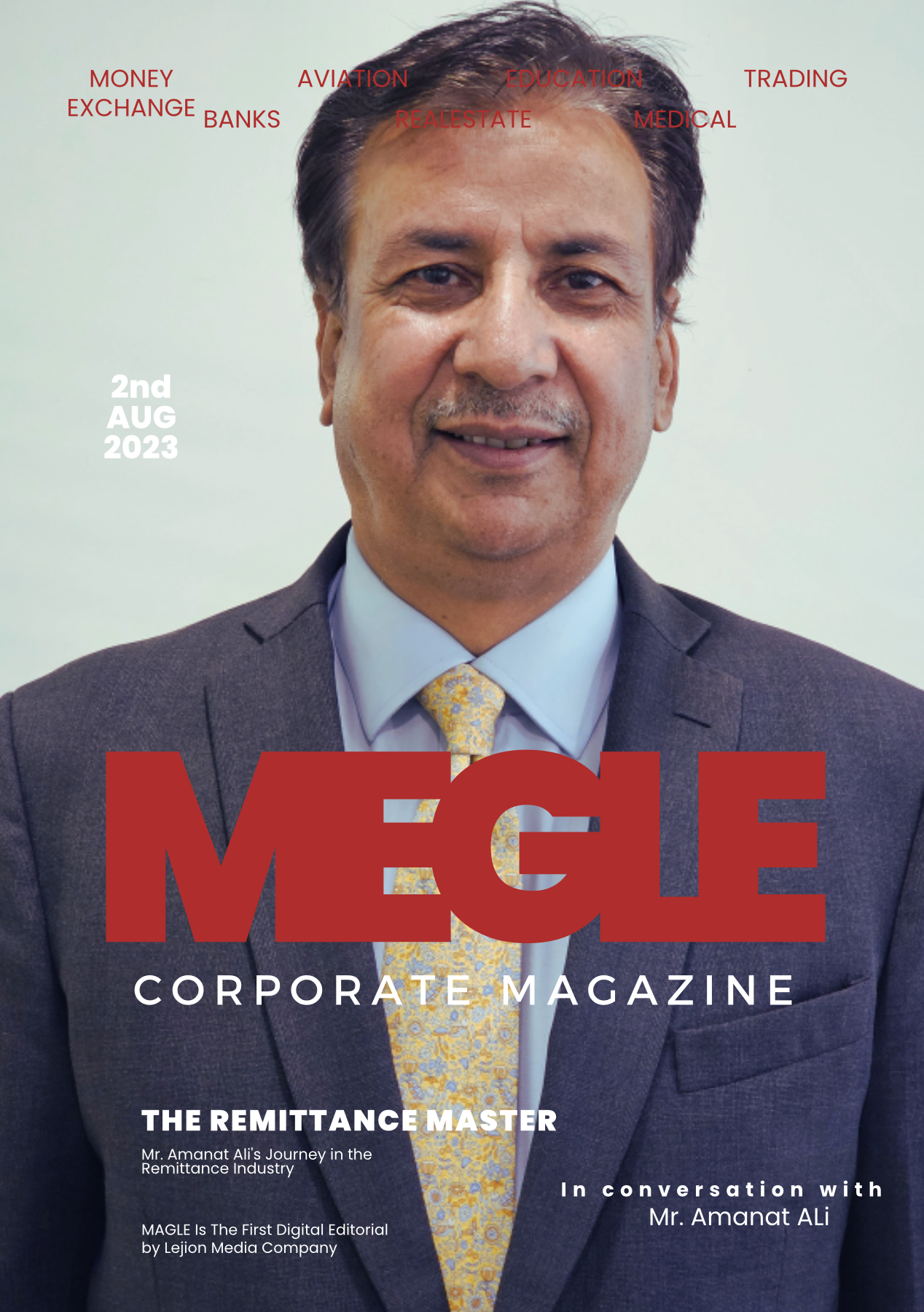The remittance industry stands as a critical pillar in today’s global economy, connecting families and communities across borders by facilitating the transfer of funds. In an exclusive interview with MEGLE magazine, we had the privilege to converse with. Mr. Amanat Ali, a seasoned professional with an illustrious career in the remittance sector. As an Advisor for Payments, Cross-Border Transfers, Digital Transform, Global Partnerships, Strategic Alliances, and Business Transformation, Mr. Ali’s profound insights shed light on the industry’s significance, the evolution of remittance tools, and his unwavering commitment to spreading happiness through his work.
The Journey to the Remittance Industry:
Mr. Amanat Ali’s journey began at Citibank N.A. Lahore, Pakistan, where he started as a Personal Banker with a primary focus on serving Non-Resident Pakistanis (NRPs) worldwide. His dedication and exceptional performance earned him temporary postings at Citibank N.A. Dubai and Saudi American Bank in Saudi Arabia to look after the NRP Desk and facilitate fund transfers. These experiences exposed him to the world of remittances and ignited a passion for empowering people through financial services.
After permanently joining the Remittance Business at Speed Cash, Saudi American Bank, Riyadh, Mr. Ali took charge of the NRP Desk of Citibank N.A. Pakistan. This marked the beginning of his remarkable 23+ years in the remittance industry, during which he held significant positions in various banks.
Understanding the Significance of Remittances:
Remittances represent more than just financial transactions; they embody the hopes, dreams, and aspirations of millions of families worldwide. The term “remittance” refers to the transfer of money from one person or entity to another, often crossing international borders. For many developing countries, remittances serve as a crucial source of income, enabling families to meet their basic needs and invest in education, healthcare, and entrepreneurial ventures.
In the United Arab Emirates (UAE), remittances play a pivotal role, the funds sent back to families in their home countries bolster economic growth and promote financial stability, further cementing the importance of the remittance industry in the global financial landscape.
Enhancing Transparency and Benefits in the Industry:
A core principle that Mr. Ali advocates for in the remittance industry is transparency. Transparent practices build trust among consumers, fostering a positive reputation for financial institutions and service providers. To achieve greater transparency and benefits for customers, several steps can be taken:
-
- Requiring remittance providers to disclose all fees and charges upfront, ensuring customers are fully informed about the costs involved in their transactions.
-
- Providing consumers with clear and transparent information about the exchange rate that will be applied to their remittance.
-
- Facilitating easy comparison of services and fees offered by different remittance providers, enabling customers to make well-informed decisions.
-
- Encouraging the use of digital remittance tools that not only offer cost-effectiveness but also provide real-time tracking and traceability, promoting greater transparency in the remittance process.
Conventional vs. Digital Remittance Tools: UAE’s Demand:
In the UAE, both conventional and digital remittance tools continue to cater to the diverse needs of customers. Conventional methods, such as bank drafts and wire transfers, have been reliable and widely used over the years. However, with the advent of digital transformation, digital remittance tools have emerged as a game-changer, revolutionizing the industry.
Digital remittance tools, also known as fintech solutions, offer unparalleled advantages over traditional methods. They provide:
-
- Unprecedented Convenience: Digital remittance tools enable users to send money globally from the comfort of their homes or on-the-go through mobile applications and online platforms.
-
- Lightning-Fast Speed: Transactions through digital tools are processed swiftly, often delivering money to the recipient’s account within minutes or hours, thereby significantly reducing waiting times.
-
- Cost-Effectiveness: Digital remittance solutions generally have lower transaction fees compared to traditional channels, saving both the sender and recipient money.
While conventional remittance methods remain relevant for certain segments of the population, the trend toward digital solutions is rapidly gaining momentum due to their superior advantages.
Educating People about Industry Advancements:
To foster greater awareness and understanding of the advancements in the remittance industry, education plays a vital role. Collaborative efforts involving government agencies, non-profit organizations, and financial institutions can create effective campaigns to raise awareness about the benefits of remittances. These campaigns can focus on:
-
- Highlighting the positive impact of remittances on recipient families and local economies.
-
- Demonstrating the ease and security of using digital remittance tools, dispelling any misconceptions or fears.
-
- Utilizing social media platforms and online channels to engage with a wider audience and promote financial literacy.
Digital remittance solutions generally have lower transaction fees compared to traditional channels, saving both the sender and recipient money.
Amanat Ali

Mr. Ali’s Achievement in the Remittance Industry:
Beyond the professional achievements, Mr. Ali takes immense pride in the respect he has earned for himself and the organizations he has been associated with over the years, namely Citibank N.A., Pakistan, Citibank N.A., Dubai, Saudi American Bank, Saudi Arabia, MCB Bank Limited, Pakistan, Emirates Islamic Bank, Dubai, Bank Albilad, Saudi Arabia, Bank Alfalah Limited, Pakistan and United Bank Limited, Pakistan. His unwavering commitment to core values such as integrity, staff development, transparency, innovation, technology, and compliance has been instrumental in building the reputation of these organizations. Moreover, his focus on adding value to remittance partners has solidified his position as a leader in the industry.
Conclusion:
Mr. Ali’s journey in the remittance industry exemplifies the transformative power of financial services and the positive impact they can have on countless lives worldwide. With a career spanning over two decades, his dedication to empowering families, spreading happiness, and advocating for greater transparency has left an indelible mark on the remittance landscape. As the remittance industry continues to evolve, individuals like Mr. Ali continues to champion progress and foster a world where financial inclusion and compassion go hand in hand.

